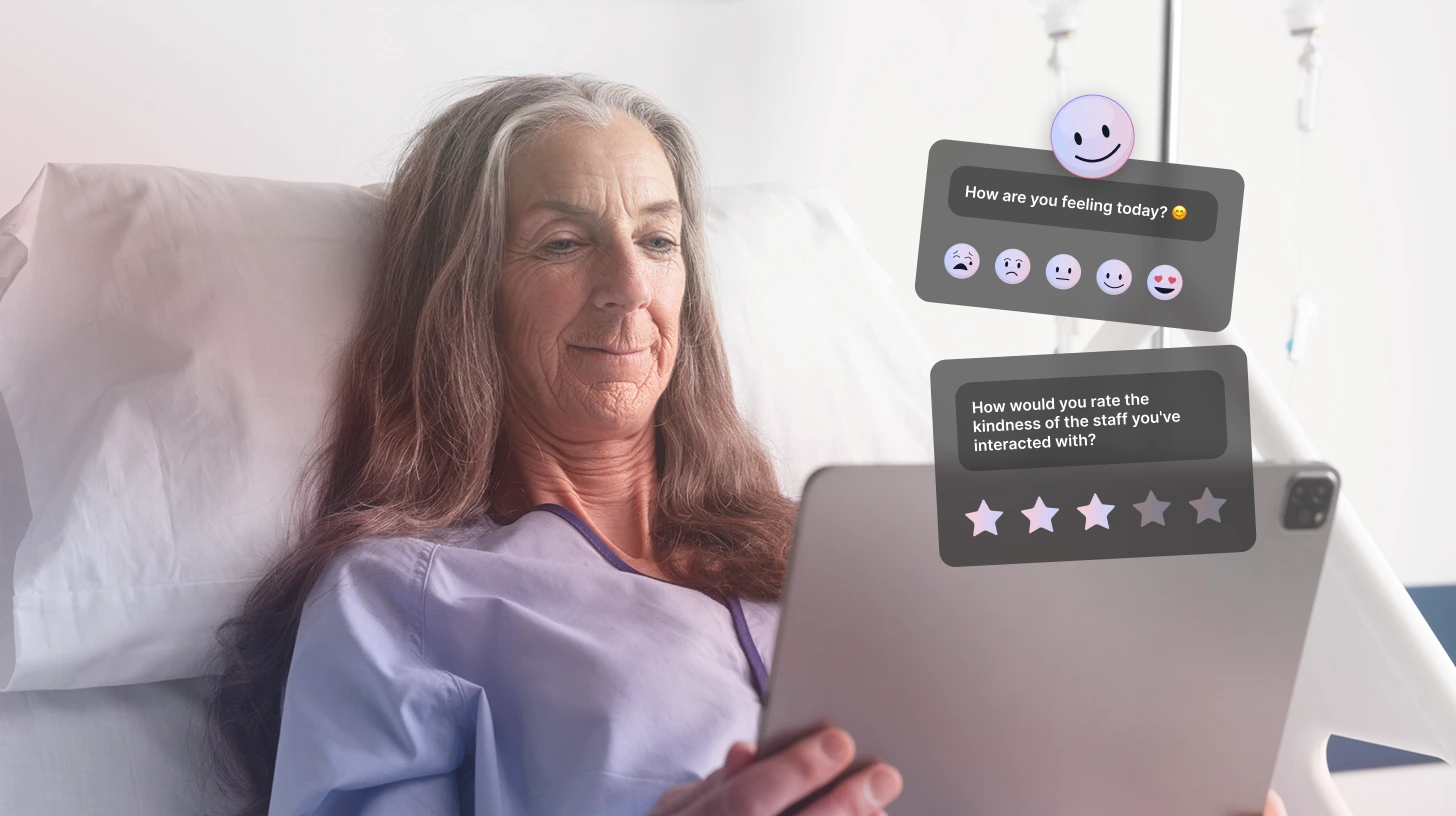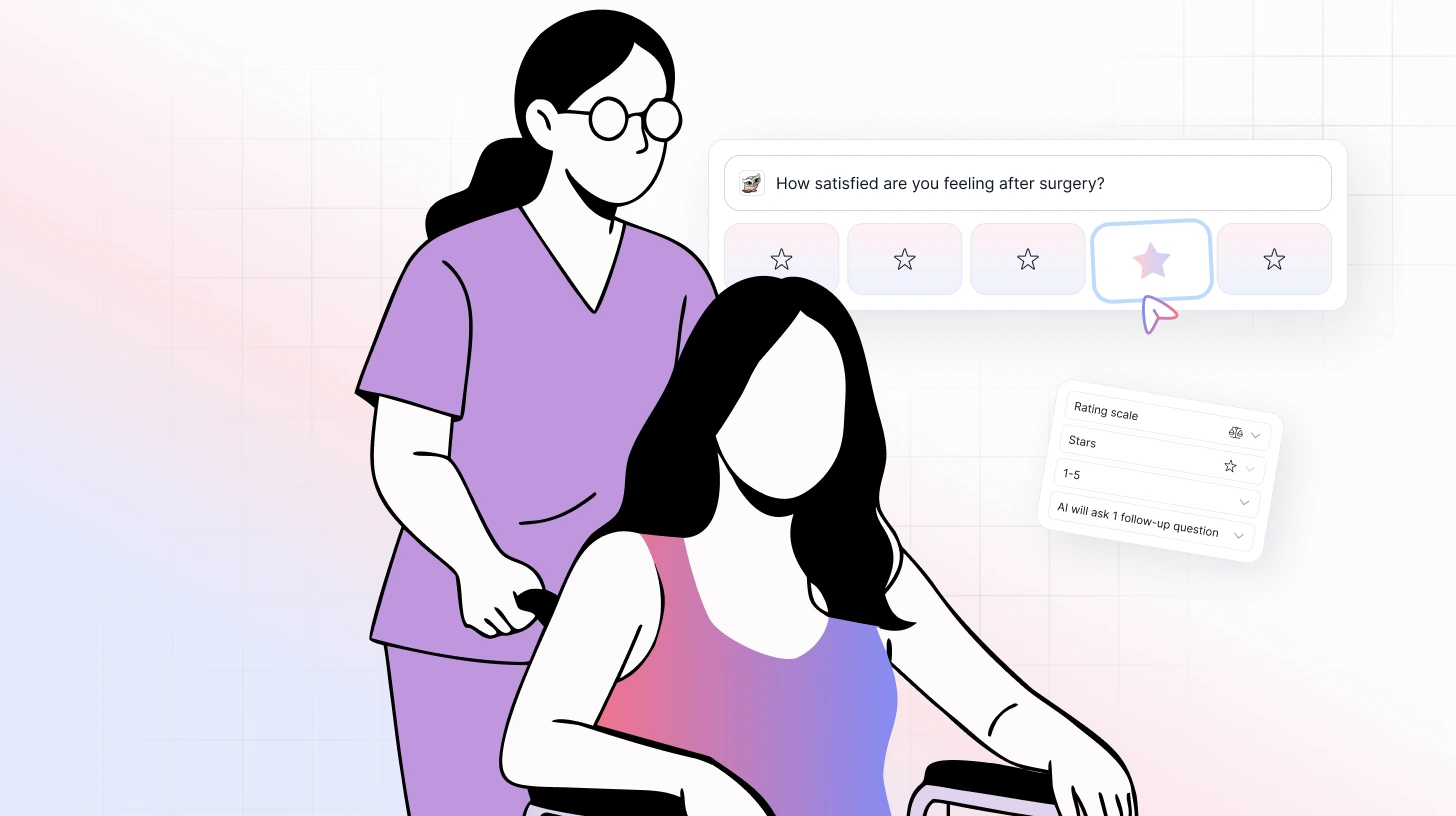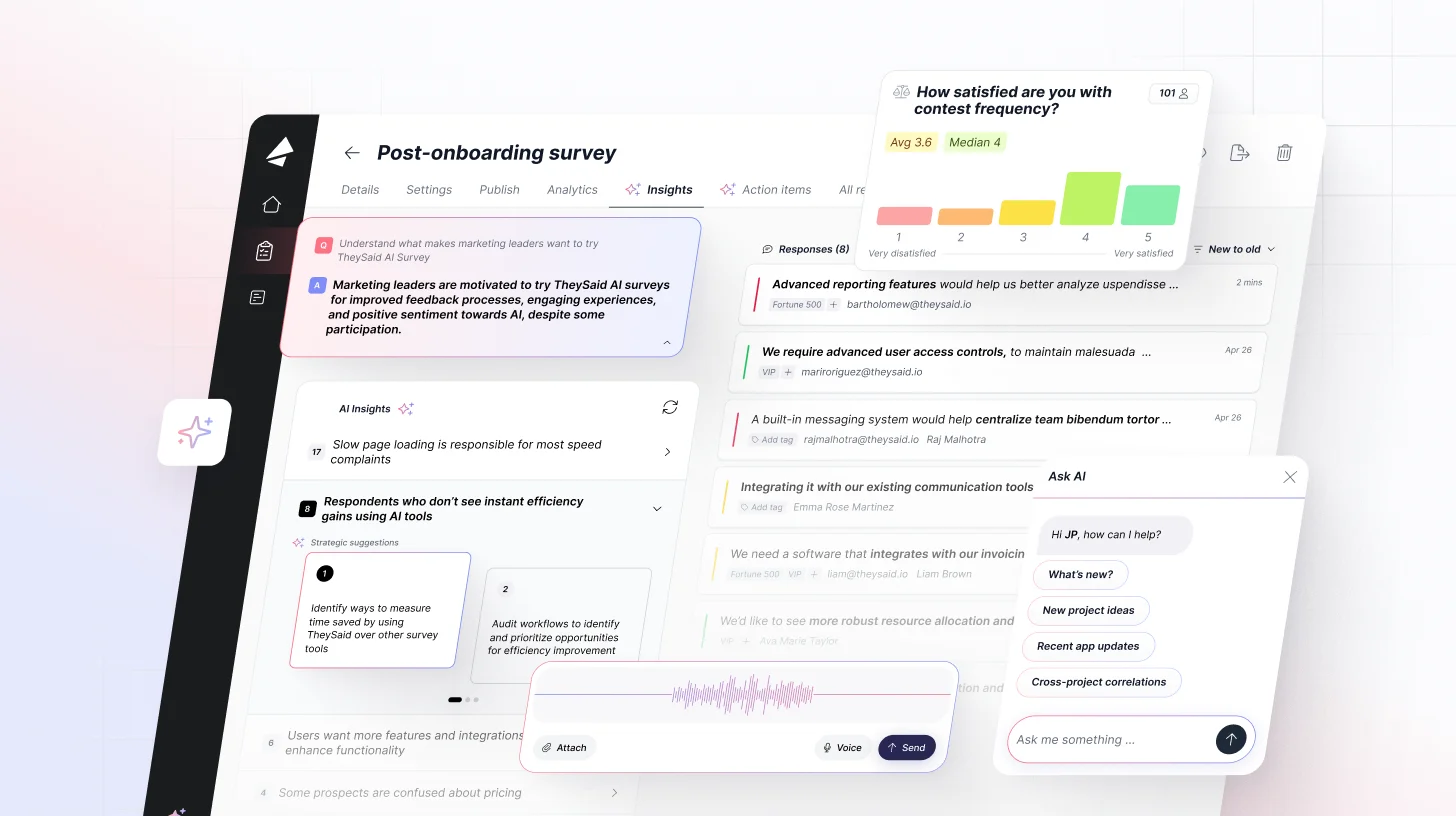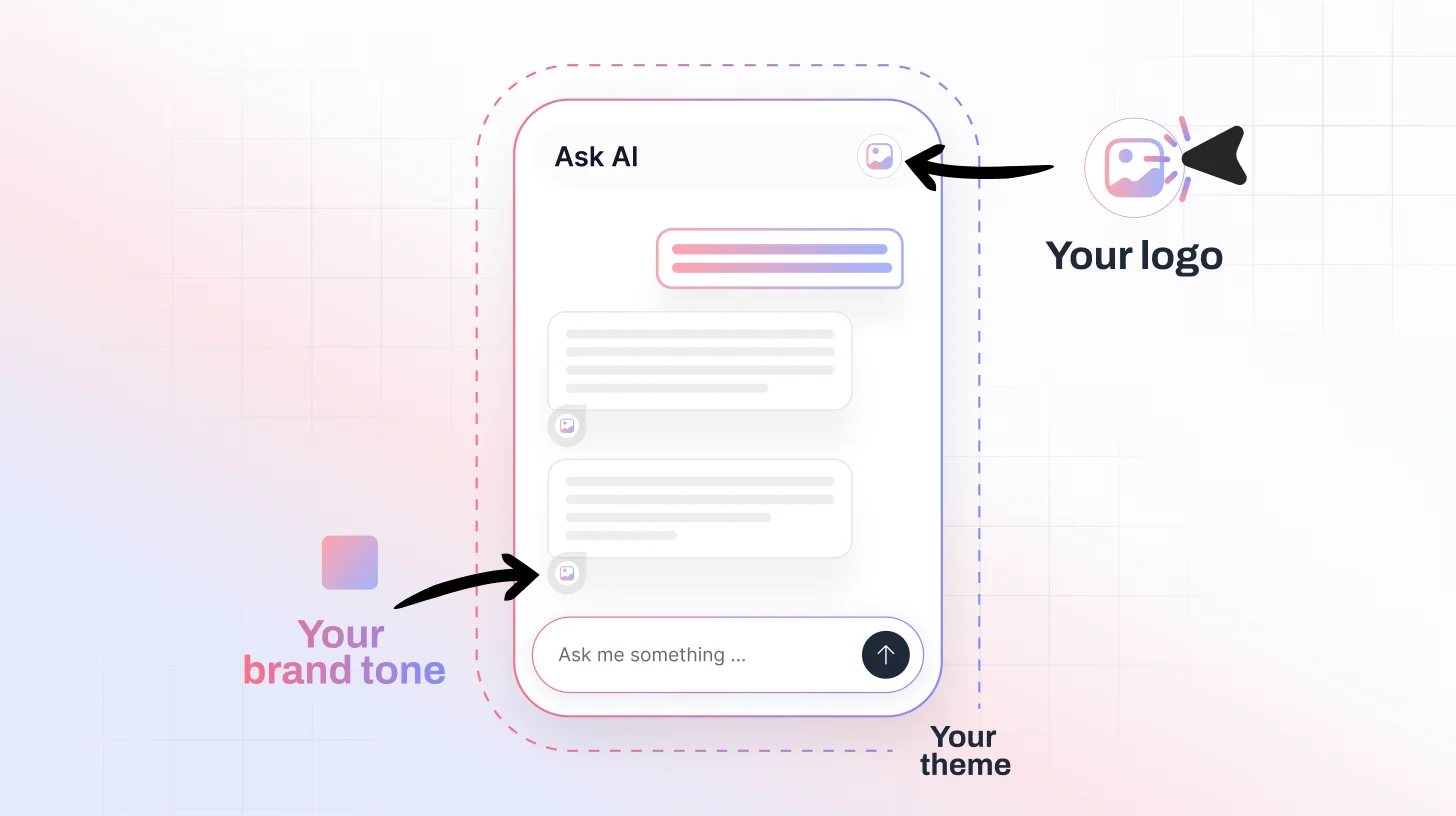 Blog
Blog Hospital Survey Questions: 50+ Examples That Improve Patient Care
Hospital Survey Questions: 50+ Examples That Improve Patient CareHospital Survey Questions: 50+ Examples That Improve Patient Care

Most hospitals miss the point about patient feedback. They ask generic questions that sound good but don't actually help improve anything. Hospital survey questions need to dig deeper than "How was your stay?"
The best questions uncover specific problems you can fix. They reveal exactly where patients struggle and what keeps them coming back for more care.
When hospitals ask the right survey questions, results follow. Recent data from 13 million patient surveys demonstrates clear improvements in care experience and safety outcomes at facilities prioritizing patient feedback.
This guide provides 50+ proven hospital survey questions across every touchpoint of the patient experience. You'll discover which questions generate actionable insights and drive real improvements in patient care.
What Makes Hospital Survey Questions Different
These questions focus specifically on inpatient experiences rather than general healthcare interactions. They address complex multi-day stays, various department interactions, and care coordination across medical teams.
These questions assess experiences unique to hospital settings: overnight stays, emergency admissions, surgical procedures, and discharge planning. They measure how well hospitals manage serious health conditions and coordinate care between specialists.
Effective survey questions connect patient feedback to specific hospital operations. They help identify bottlenecks in nursing response times, communication gaps between care teams, and environmental factors affecting recovery.
Unlike clinic surveys that focus on single appointments, hospital survey questions evaluate comprehensive care journeys that span multiple days and departments.
Pre-Admission and Scheduling Survey Questions
Getting into the hospital sets the tone for everything that follows. These questions help identify friction in your admission process:
Appointment and Pre-Registration
- How easy was it to schedule your hospital admission?
- Did someone explain what to expect during your stay before you arrived?
- How clear were the pre-admission instructions you received?
- Were you able to complete paperwork before arriving at the hospital?
Insurance and Financial Questions
- Did staff clearly explain your insurance coverage and expected costs?
- How satisfied were you with the financial counseling you received?
- Were there any unexpected charges that weren't explained beforehand?
Preparation and Communication
- Did you receive adequate information about preparing for your procedure or stay?
- How well did staff communicate about what items to bring to the hospital?
- Were your questions answered promptly before your admission?
Emergency Department Survey Questions
Emergency visits create unique stresses and expectations. These questions capture the ED experience:
Wait Times and Triage
- How long did you wait before being seen by a medical professional?
- Did staff keep you informed about expected wait times?
- How would you rate the triage process when you first arrived?
- Were you comfortable in the waiting area during your visit?
Communication and Care
- Did emergency staff explain your condition and treatment clearly?
- How well did the medical team listen to your concerns?
- Did you feel rushed during your emergency department visit?
- Were your family members kept informed about your care?
Facility and Environment
- How would you rate the cleanliness of the emergency department?
- Was the emergency department environment calm and organized?
- Did you feel safe and secure during your ED visit?
Nursing Care Survey Questions
Nurses provide round-the-clock patient care. These questions evaluate nursing performance:
Communication and Responsiveness
- How quickly did nurses respond when you called for help?
- Did nurses explain procedures and medications before administering them?
- How well did the nursing staff listen to your concerns and questions?
- Were nurses respectful when communicating with you and your family?
Clinical Competency
- Did you feel confident in your nurses' clinical skills and knowledge?
- How well did nurses manage your pain and comfort needs?
- Did nursing staff coordinate well with your doctors and other care providers?
- Were nurses thorough when checking on your condition?
Personal Care and Comfort
- Did nurses help you maintain your dignity during personal care?
- How well did nursing staff accommodate your cultural or religious needs?
- Were nurses patient and understanding when you needed extra assistance?
- Did nurses encourage your participation in your own care?
Physician Communication Survey Questions
Doctor interactions significantly impact patient satisfaction. These questions assess physician performance:
Bedside Manner and Communication
- Did your doctors treat you with courtesy and respect?
- How well did physicians explain your medical condition in terms you could understand?
- Did doctors listen carefully to your questions and concerns?
- Were physicians available when you needed to speak with them?
Medical Decision Making
- Did doctors include you in decisions about your treatment and care?
- How clearly did physicians explain the risks and benefits of procedures?
- Did your medical team coordinate well when multiple doctors were involved?
- Were you confident in your doctors' medical expertise and judgment?
Discharge and Follow-up
- Did doctors give you clear instructions for care after leaving the hospital?
- How well did physicians explain what symptoms to watch for at home?
- Did doctors schedule appropriate follow-up appointments before discharge?
- Were medication changes clearly explained by your medical team?

Read - Everything You Need to Know About Healthcare Surveys
Hospital Environment and Facilities Questions
The physical environment affects healing and comfort. These questions evaluate facility quality:
Room and Accommodation
- How would you rate the cleanliness of your hospital room?
- Was your room quiet enough for rest and recovery?
- Did you have adequate privacy in your hospital room?
- Were the temperature and lighting comfortable in your room?
Common Areas and Navigation
- How easy was it to find your way around the hospital?
- Were common areas like waiting rooms clean and comfortable?
- Did the hospital provide clear signage and directions?
- How would you rate the overall appearance and maintenance of the facility?
Safety and Security
- Did you feel safe and secure during your hospital stay?
- Were safety features like handrails and call buttons easily accessible?
- How well did staff maintain infection control procedures?
- Were visiting hours and security policies clearly communicated?
Food Service and Dietary Survey Questions
Hospital meals impact patient experience and recovery. These questions assess food service:
Meal Quality and Variety
- How would you rate the taste and quality of hospital meals?
- Were there adequate food choices that met your dietary needs?
- Did meals arrive at appropriate temperatures?
- How satisfied were you with portion sizes?
Dietary Accommodation
- Did the hospital accommodate your special dietary requirements?
- Were staff knowledgeable about food allergies and restrictions?
- Could you easily request menu changes when needed?
- How well did meals align with your cultural or religious preferences?
Service and Timing
- Did meals arrive at scheduled times?
- Were food service staff courteous and helpful?
- Could you easily order meals or snacks between scheduled meal times?
- Did someone explain menu options and help with meal planning?
Discharge and Follow-up Survey Questions
Smooth transitions home are critical for recovery. These questions evaluate discharge processes:
Discharge Planning and Education
- Did staff begin discharge planning early in your stay?
- Were discharge instructions clear and easy to understand?
- Did you receive written information about caring for yourself at home?
- Were family members included in discharge planning when appropriate?
Medication Management
- Did someone clearly explain your medications before you left?
- Were medication instructions written in terms you could understand?
- Did staff help coordinate prescription pickups or deliveries?
- Were potential side effects and drug interactions explained?
Follow-up Care Coordination
- Were follow-up appointments scheduled before you left the hospital?
- Did staff coordinate with your primary care doctor about your stay?
- Were you given clear instructions about when to call the hospital?
- Did someone explain what symptoms should prompt immediate medical attention?
Overall Experience Hospital Survey Questions
These questions capture the complete hospital experience:
Satisfaction and Quality
- How would you rate your overall hospital experience?
- Would you recommend this hospital to family and friends?
- Did your hospital stay meet your expectations for quality care?
- How likely are you to choose this hospital again if you need care?
Care Coordination
- How well did different departments work together during your stay?
- Did you feel like all your care providers communicated with each other?
- Were transitions between units or departments handled smoothly?
- Did someone coordinate your care and serve as your primary contact?
Value and Accessibility
- Do you feel the care you received was worth the cost?
- Were services accessible to people with disabilities?
- Did staff accommodate language or communication barriers?
- How would you compare this hospital to others in your area?
Read - How Medical Surveys Are Powering the Future of Healthcare in 2025
Best Practices for Crafting Hospital Survey Questions

Smart hospitals follow proven strategies when designing survey questions.
- Keep questions specific and actionable: Ask about things you can actually change. Instead of "How was your stay?" ask "How quickly did nurses respond when you pressed the call button?"
- Use mixed question types: Combine rating scales with open-ended follow-ups. Rating questions provide quantifiable data while open-ended responses reveal specific improvement areas.
- Time questions strategically: Send surveys within 48-72 hours after discharge. Patients remember experiences clearly while emotions haven't faded yet.
- Focus on key touchpoints: Prioritize questions about interactions that most impact patient satisfaction - nursing care, physician communication, and discharge planning.
- Make questions easy to answer: Use simple language and avoid medical jargon. Patients dealing with health issues need straightforward questions they can answer quickly.
- Test mobile compatibility: Over 60% of patients complete surveys on smartphones. Questions must display properly on small screens with easy answer options.
- Limit survey length: Keep surveys under 15 questions for higher completion rates. Focus on your most important improvement priorities rather than asking everything.
Also Read: Hospital Surveys: The #1 Tool for Patient Satisfaction
Common Hospital Survey Question Mistakes
Leading Questions: Don't ask "How satisfied were you with our excellent nursing staff?" Instead ask "How would you rate the quality of nursing care you received?"
Double-Barreled Questions: Avoid asking about two things at once like "Were nurses friendly and knowledgeable?" Split this into separate questions about friendliness and competency.
Vague Timeframes: Instead of asking about "recent" experiences, specify "during your hospital stay" or "in the 24 hours before discharge."
Overwhelming Patients: Don't survey patients still receiving active treatment. Wait until after discharge when they can reflect on the complete experience.
Ignoring Cultural Sensitivity: Include questions about cultural accommodation and ensure surveys are available in multiple languages when needed.
How TheySaid Revolutionizes Hospital Survey Management
Traditional hospital survey tools often create more work than value. TheySaid's AI-powered platform changes that by automatically analyzing patient feedback and identifying priority improvement areas.
Our system processes thousands of survey responses instantly, spotting patterns human reviewers might miss. It flags urgent issues requiring immediate attention while tracking long-term satisfaction trends across departments.
TheySaid integrates seamlessly with hospital systems, maintains HIPAA compliance, and provides real-time dashboards that help administrators make data-driven decisions quickly.
Hospitals using TheySaid report 40% faster response times to patient concerns and significant improvements in satisfaction scores across all measured areas.
Key Takeaways
- Hospital survey questions must address inpatient-specific experiences and multi-department care coordination
- Focus questions on actionable areas like nursing response times, physician communication, and discharge planning
- Mix rating scales with targeted follow-up questions for comprehensive feedback
- Send surveys within 48-72 hours after discharge for optimal response accuracy
- Avoid leading questions and medical jargon that confuse or bias patient responses
Frequently Asked Questions
Q: How many hospital survey questions should I include in one survey?
A: Limit hospital surveys to 10-15 questions maximum to maintain high completion rates. Focus on your most critical improvement priorities rather than trying to measure everything at once.
Q: When is the best time to send survey questions to patients?
A: Send hospital surveys 48-72 hours after discharge for optimal results. This timing allows patients to recover from immediate post-discharge fatigue while keeping the experience fresh in their memory. Avoid surveying patients still receiving active treatment.
Q: What response rate should hospitals expect from patient surveys?
A: Hospital survey response rates typically range from 20-35% for digital surveys and 40-60% for phone-based surveys. Higher response rates indicate better patient engagement and survey design quality. Shorter, more focused surveys generally achieve better completion rates.
Q: How can hospitals improve survey response rates for patient feedback?
A: Keep surveys short and mobile-friendly, use simple language without medical jargon, send surveys at optimal timing post-discharge, and clearly explain how feedback will improve patient care. Consider offering small incentives like parking vouchers for survey completion.
Q: What makes hospital survey questions different from general healthcare surveys?
A: Hospital survey questions focus on multi-day inpatient experiences including overnight stays, complex care coordination, nursing interactions, and discharge planning. They address experiences unique to hospital settings rather than single appointment interactions typical in outpatient care.
















.svg)